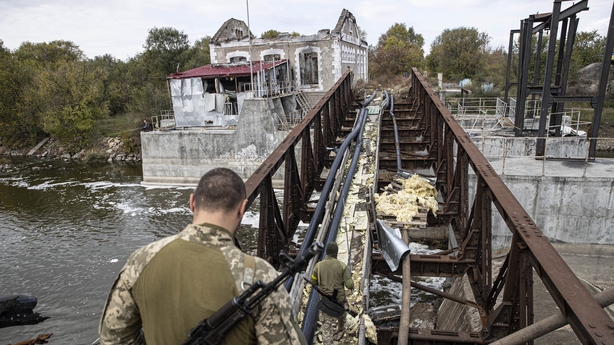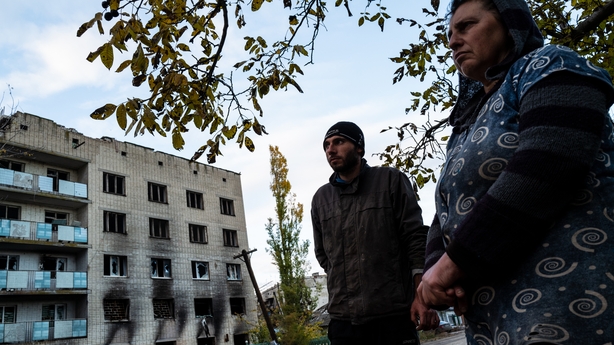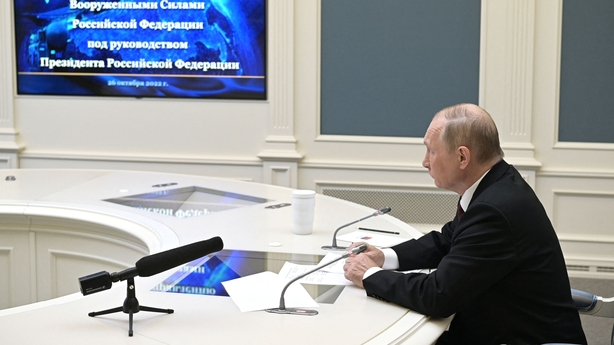Russian President Vladimir Putin has said that the world faced the most dangerous decade since World War II.
In one of his longest public appearances since he sent troops into Ukraine on 24 February, Mr Putin signalled he had no regrets about what he calls "a special operation" and accused the West of inciting the war and of playing a "dangerous, bloody and dirty" game that was sowing chaos across the world.
"The historical period of the West's undivided dominance over world affairs is coming to an end," Mr Putin, told the Valdai Discussion Club during a session entitled "A Post-Hegemonic World: Justice and Security for Everyone".
"We are standing at a historical frontier: Ahead is probably the most dangerous, unpredictable and, at the same time, important decade since the end of World War II."
We need your consent to load this rte-player contentWe use rte-player to manage extra content that can set cookies on your device and collect data about your activity. Please review their details and accept them to load the content.Manage Preferences
He added that a mission of the UN's atomic agency should inspect Ukraine's nuclear sites "as fast as possible", reiterating claims that Kyiv is preparing to use a "dirty bomb".
"They say the International Atomic Energy Agency (IAEA) wants to come and check Ukraine's nuclear facilities. We are in favour. And it should be done as fast as possible," Mr Putin told members of the annual Valdai Discussion Club, adding that Kyiv is "doing everything to cover up traces of this preparation".
Mr Putin added that Russia has no need to nationalise assets to deal with the economic fallout of sanctions and the conflict in Ukraine.
He also said it was a "gift" to local investors and businesses that swathes of Western companies have left Russia since it sent tens of thousands of troops into Ukraine in February.
Ukraine holds out in the east
Meanwhile, Ukrainian troops are holding out against repeated attacks by Russian forces in two eastern towns while those on the southern front are poised to battle for the strategic Kherson region, which Russia appears to be reinforcing.
Ukrainian President Volodymyr Zelensky said in an evening video address that there would be good news from the front but he gave no details.
He did not mention what was happening in Kherson in the south, which officials and military analysts have predicted will be one of the most consequential battles of the war since Russia invaded Ukraine eight months ago.
The most severe fighting in eastern Ukraine was taking place near Avdiivka, outside Donetsk, and Bakhmut, Mr Zelensky said.
"This is where the craziness of the Russian command is most evident. Day after day, for months, they are driving people to their deaths there, concentrating the highest level of artillery strikes," he said.
Russian forces have repeatedly tried to seize Bakhmut, which sits on a main road leading to the Ukrainian-held cities of Sloviansk and Kramatorsk.
The looming battle for Kherson city at the mouth of the Dnipro River will determine whether Ukraine can loosen Russia's grip on the south.
The Russian-appointed Kherson regional government said it had rebased to the left bank of the Dnipro, Russia's RIA news agency reported, as forces braced for an increase in fighting.
While authorities in Moscow-annexed Crimea said that a thermal power plant on the peninsula was targeted by an overnight drone attack, but was not badly damaged.
"Today at night there was a UAV (unmanned aerial vehicle) attack on the Balaklava thermal power station," the Russian-installed governor of Sevastopol Mikhail Razvozhayev said on Telegram.
"The transformer is minimally damaged. There were no casualties," he added.

The official said there was "no threat to power supply" and that "the incident does not affect the power supply of Sevastopol and the peninsula."
He said the transformer that caught fire during the supposed attack "was under maintenance and did not work".
"Workers at the plant quickly dealt with the fire," he added.
Moscow's forces fighting in Ukraine have in recent weeks hit the country's power supplies.
Shelling
While much of the front line remains off limits to journalists, at one section north of the Russian-occupied pocket on the west bank of the Dnipro, Ukrainian soldiers said Russian shelling was stepping up again after having tailed off in recent weeks.
Radio intercepts indicated freshly mobilised recruits had been sent to the front and Russian forces were firmly dug in.
"They have good defensive lines with deep trenches, and they are sitting deep underground," said Vitalii, a Ukrainian soldier squatting in a weed-choked irrigation canal, concealed from any prowling enemy drones by overhanging trees.
Ukrainian forces advanced along the Dnipro in a dramatic push in the south at the start of this month, but progress appears to have slowed.
Russia has been evacuating civilians on the west bank but says it has no plans to pull out its troops.
Oleksii Reznikov, Ukraine's defence minister, said wet weather and rough terrain were making Kyiv's counter-offensive in Kherson harder than it was in the northeast, where it pushed Russia back in September.
At the front, intermittent artillery fire echoed from both sides, with towers of smoke rising in the distance.

A Ukrainian helicopter gunship swept low over fields, loosed rockets at the Russian positions and wheeled around spitting flares to distract any heat-seeking anti-aircraft rockets fired at it.
Australia said it was sending 30 more armoured vehicles and deploying 70 soldiers to Britain to help train Ukrainian troops there to bolster Kyiv's war effort.
"We're mindful that Ukraine needs to now be supported over the longer term if we're going to put Ukraine in a position where it can resolve this conflict on its own terms," Defence Minister Richard Marles told ABC television.
Ukraine has boosted its forces in the northern region near Belarus to counter any possible renewed Russian attack across the border, Ukraine's General Staff said.
"At the current time the creation of a strike force (in Belarus) is not observable. (But) there are and will be threats. We are reacting, we have already increased our troops in the northern direction," Oleksii Hromov, deputy head of the General Staff's Main Operations Directorate, told a regular briefing.
Meanwhile a senior Russian foreign ministry official said that commercial satellites from the US and its allies could become legitimate targets for Russia if they were involved in the war in Ukraine.
"Quasi-civilian infrastructure may be a legitimate target for a retaliatory strike," Konstantin Vorontsov, deputy director of the foreign ministry's department for non-proliferation and arms control, was quoted as saying by TASS.
"We are talking about the involvement of components of civilian space infrastructure, including commercial, by the United States and its allies in armed conflicts," Mr Vorontsov was quoted as saying at the United Nations.
Nuclear rehearsal
Since Russia began losing ground in a counter-offensive in September, Mr Putin has taken a series of steps to intensify the conflict, calling up hundreds of thousands of Russian reservists, proclaiming the annexation of occupied land and repeatedly threatening to use nuclear weapons to defend Russia.
This month, Russia launched a new campaign of strikes using missiles and Iranian-made drones against Ukraine's energy infrastructure, also hitting parks and homes across the country.

Russians continued to "terrorise" the Kyiv region, launching several attacks last night, governor Oleksiy Kuleba said on the Telegram messaging app.
"The elimination of the fire and the consequences of the attack is ongoing," he said, adding there were no casualties.
In Russia, the military staged a high-profile rehearsal for nuclear war, with state television broadcasts dominated by footage of submarines, strategic bombers and missile forces practicing launches in retaliation for an atomic attack.
Moscow has conducted a diplomatic campaign this week to promote an accusation that Kyiv is preparing to release nuclear material with a so-called "dirty bomb", an allegation the West calls baseless and a potential pretext for Russian escalation.
Despite the rising tensions, United Nations aid chief Martin Griffiths said he was "relatively optimistic" that a UN-brokered deal that allowed a resumption of Ukraine Black Sea grain exports would be extended beyond mid-November.
